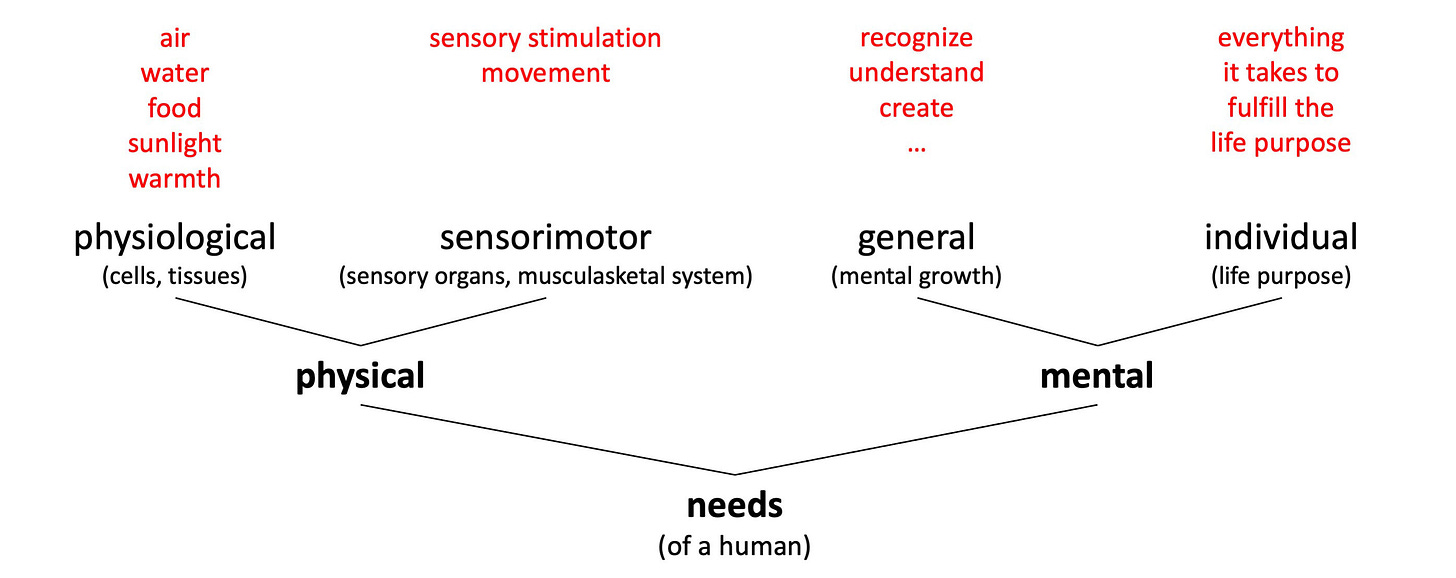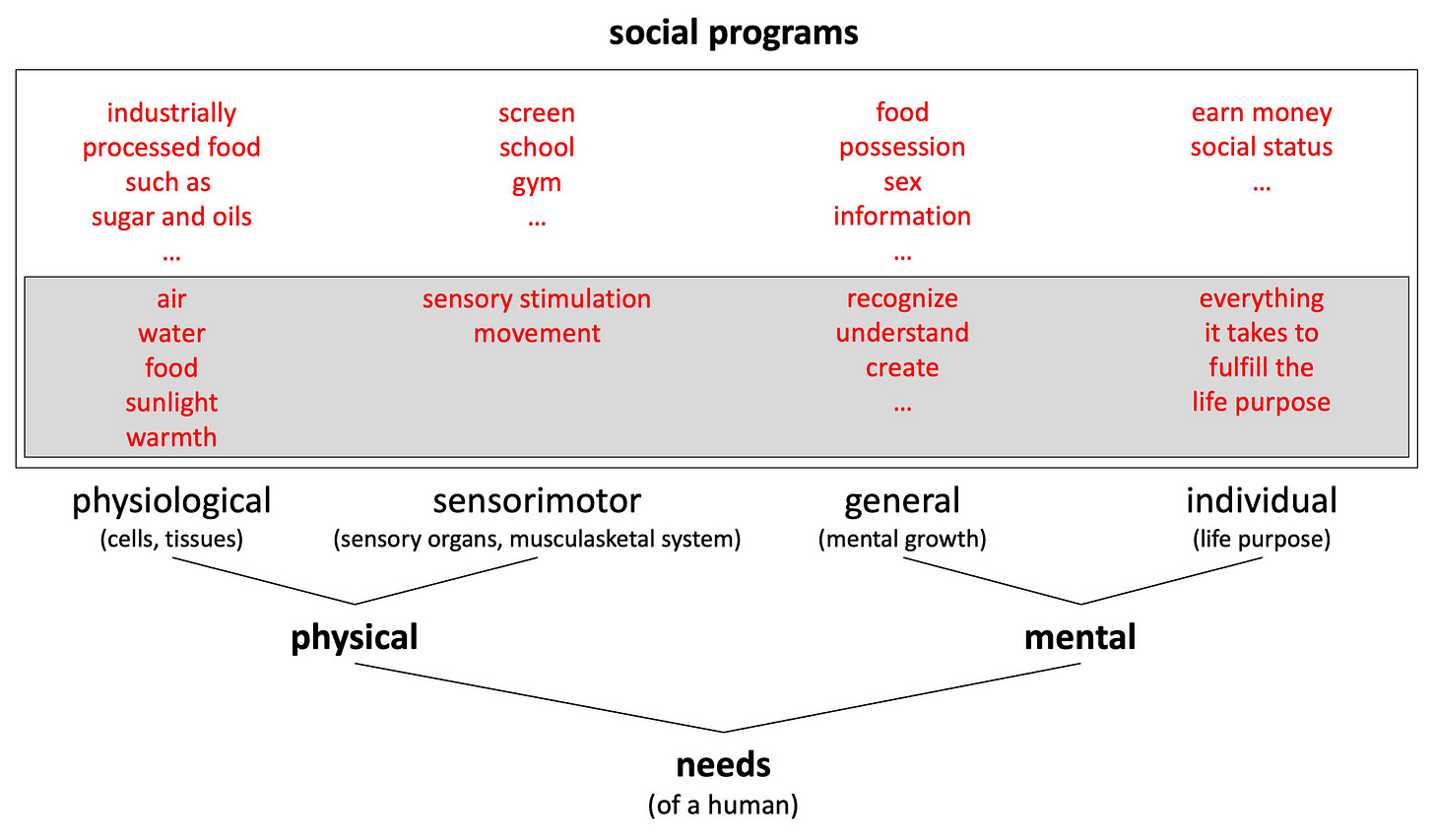You have physical and mental needs. Your body needs air, water, food, sunlight, and warmth. These physiological needs serve to maintain your cells and tissues. Your body also needs sensory stimulation and movement. These sensorimotor needs serve to keep your sensory organs and musculoskeletal system healthy. You also have two types of mental needs:
The general mental need is the need to grow mentally. This need is fulfilled by recognizing, understanding, and creating.
The individual mental need is the need to fulfill your life’s purpose. To do this, you need what you need for it.
Many of your needs arise from your life’s purpose. Perhaps you need certain experiences, maybe money, training, travel, encounters, a partner, and so on.
Everything in the universe has a purpose as part of the whole. The purpose of a bee, for example, is to be a bee. It fulfills a task as part of the biosphere of this planet. The purpose of an oak tree is to be an oak tree. A cheetah has the purpose of being a cheetah. And so on. In cells, plants, and animals, what they need in order to fulfill their purpose is genetically inherent. A cheetah has no choice but to be a runner; it is neither a diver nor a flyer. A human has an infinite number of possibilities. He can be a farmer, an engineer, a doctor, a teacher, a musician, a writer, a philosopher, and so on. So the central question is: how do you find your life’s purpose among all these possibilities?
For an answer, we must understand needs. We experience them as hunger and appetite. Hunger is an emptiness. Breathe out and then don’t breathe in again for a few seconds. You experience the emptiness in your lungs as a hunger; the longer the emptiness lasts, the hungrier you become. Hunger is accompanied by an appetite. This word comes from the Latin appetere, meaning ‘to long for.’ When your lungs are hungry, you have an appetite for oxygenated air. When your cells and tissues are hungry for water, nutrients, or vital substances, you have an appetite for water or food that provides what is missing. You also have an appetite for knowledge and creation. An appetite also generates your search for the meaning of life, which is nothing other than the search for your life’s purpose.
Hunger seeks fulfillment. Appetite gives hunger a direction. It shows you what you should fill the void with. But in most humans, neither hunger nor appetite work – neither physically nor mentally. The reason is that we learn needs, which then superimpose our natural and true needs.
In nature, animals eat when they are hungry, they stop eating when they are no longer hungry, and they eat what they have an appetite for. A cow eats grass – not meat. A lion eats meat – not grass. For us humans, our natural physiological hunger and appetite is buried very early on. Industrially processed foods irritate the metabolism and upset natural hunger and appetite; this can lead to addictions, such as sugar.
The situation is similar for sensorimotor needs. Animals are hungry for sensory stimuli and movement. They observe their surroundings with all their senses and roam around. Children also explore their surroundings with all their senses; they look, listen, touch, taste, etc and they are constantly moving. They do this until they learn to sit still, stare ahead at a screen, a teacher, or a book, and watch and listen. The other senses are then increasingly neglected. Children also learn to move under supervision in gym class – instead of spontaneously following their appetite for movement. Later, they go to the gym and follow their fitness trainers.
Children satisfy their general mental hunger and appetite by constantly exploring the world. They do this in their play.
“Play is the highest form of research.”
(Albert Einstein)
Unfortunately, most adults do not take children’s play seriously enough. Imagine a child who is absorbed in its play. A parent calls it to lunch. The child says that it is not hungry. But it must obey; it must stop its play and eat. The playing child is mentally hungry. Its mental appetite has chosen a game. Play was its mental food. But the child is forced to interrupt its play. It is forced to eat something even though it is not physically hungry. The child learns to try to satisfy its mental hunger with physical food. But this doesn’t work. Over time, this program becomes stronger and stronger and the child turns from an active explorer into a passive consumer. Instead of curiously exploring the world, it pseudo-curiously explores the fridge or pantry. Food has become a substitute channel for its mental hunger. Other substitute channels we learn when growing up include possessions, sex, information, travel, and drugs. But substitute channels cannot provide real fulfillment, which is why we use them again and again, but without success. See my book “Curiosity – The Mental Hunger of Humans.”
Finally, there is also the individual mental hunger and appetite that leads us to our life’s purpose. Good examples of how this can happen are Albert Einstein, Pablo Picasso, and Nikola Tesla.
Pablo’s first word was “piz,” the short form of the Spanish word for pencil; he had a father who was a drawing teacher and therefore recognized and encouraged his son’s talent early. This set the course for Picasso’s career as a painter.
When Einstein was four or five years old, his father gave him a compass. Albert was totally fascinated. He wanted to know why the needle behaved the way it did. He enjoyed exploring such questions – and became a physicist. Einstein developed the special theory of relativity by thinking about magnetism.
As a child, Tesla had a cat. When he was four or five years old, he noticed sparks were jumping from the cat’s fur to his fingers when he stroked it. He asked his father for an explanation. The father didn’t know, but suspected a connection with the lightning during a thunderstorm. Nikola then asked himself: Is nature nothing more than a big cat? He became an electrical engineer and genius inventor – and lightning was his trademark.
There was a ‘cosmic guidance’ at work. The cosmos is the order in the universe. It “drives” everything and everyone to fulfill their purpose as part of the whole. It is like a conductor of an orchestra. Through the cosmos, everything comes into your life that you need to fulfill your life’s purpose, such as people and circumstances. Intuition is everyone’s connection to the cosmos. I explain this in my article “Intuition Is Much More Than Just a Sixth Sense.” Intuition works perfectly in animals, plants, and cells; it also works in young children – until they lose their access because of social programs. Parents play a decisive role in this – either as supporters or preventers. Einstein, Picasso, and Tesla were lucky enough to grow up in a supportive environment. Their path was, therefore, easy at first. It was only later that they had to overcome enormous obstacles, some of which threatened their very existence. For some people, the path begins with difficulty. Whatever your circumstances, they are perfect for you.
Another word for life’s purpose is vocation … from Latin vocatio, meaning ‘a calling.’ A calling is nothing other than the mental appetite for fulfilling your life’s purpose. Unfortunately, only very few people are following their calling; most have a job that earns them money. They do this because it is what they have learned to do. I describe how we have collectively begun to work for money instead of following our calling in my article “Bartering = Deceiving.”
Very few people fulfill their natural or true needs. The reason is social programs. People need what they have learned to need. But because what they find or get does not fulfill their true needs, they remain hungry and, therefore, searching. In my article “Why the Question ‘What Am I?’ is Important and Magical?” I describe this situation as a metaphor.
There is another aspect to this topic that I will not go into here: If a hunger remains unfulfilled, aggression naturally arises. I explain the connections and consequences in my article “Why is There So Much Aggression?”.
So it is about recognizing our natural and true needs; so that we can fulfill them; so that we have a maximally fulfilled life. To do this, you must free yourself from your learned needs. I describe how to do this in my article “How to Become What You Truly Are in 7 Steps” and in my book “Being Free – Get Out of the Box.”
Further reading:
Book “Curiosity – The Mental Hunger of Humans”
Article “Intuition Is Much More Than Just a Sixth Sense”
Article “Bartering = Deceiving”
Article “Why the Question ‘What Am I?’ is Important and Magical?”
Article “Why is There So Much Aggression?”
Article “How to Become What You Truly Are in 7 Steps”
Book “Being Free – Get Out of the Box”
See also:
Article “How to Find Your Purpose in Life”
Article “To Survive as a Species, We MUST Work Together”
Article “What is Love – and Why Do We Need It?”







I find very often successful people talking about life's purpose and intuition and a higher guidance. But then I see people suffering. Monetary suffering or stuff like that is still fine but getting murdered because you stood up against corruption or getting raped as a child. How can the universe have a purpose like that for a human being???
Also how do I differentiate a personal calling from my conditioning? For instance I sometimes find myself not wanting the life of a housewife and instead want to have a career that takes me places. But sometimes I wonder "Is it really my calling or is it something I was conditioned to beleive.. that you should want to have a career and being a housewife is not something one should aim for because it's not respectable.